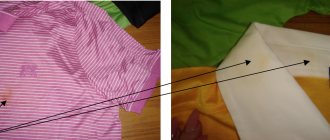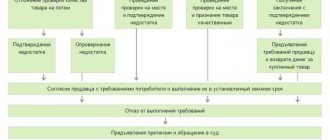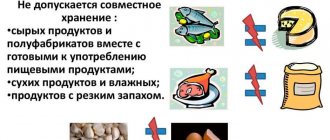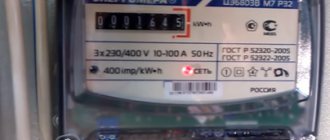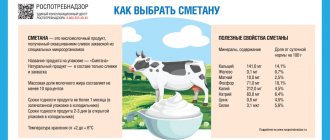Everyday relationships between people are of a consumer nature. Some act as sellers, others as buyers. The quality of goods and services provided, as well as the rights of each party to trade relations, is regulated by the Law “On Consumer Rights”, as well as other legal norms, in particular Government Decree No. 55 of January 19, 1998.
According to these documents, each retail outlet must have a “Book of Reviews and Suggestions.” What is the complaint book, what is it for, how to leave a complaint and in what order will it be considered?
- Regulations for maintaining a book of complaints and suggestions
- Rules for registering a book of complaints and suggestions
- Where to find the book of complaints and suggestions
- How to write a complaint in the guest book
- Rules for writing a complaint in the book of complaints and suggestions
- Consumer Complaint Process
- Peculiarities of consideration of claims entered in the complaint book
What is consumer fraud
The content of the article
Consumer deception is illegal actions that violate consumer rights, for which the perpetrators can be brought to administrative and civil liability (Article 43 of the Law of 02/07/1992 N 2300-1; Article 14.7 of the Code of Administrative Offenses of the Russian Federation; Article 15 of the Civil Code of the Russian Federation) .
Such actions can be committed in organizations that sell goods, perform work or provide services to the population, as well as individual entrepreneurs in the field of trade (services), both officials and other employees (for example, sellers or cashiers) of these business entities (clause 14 Resolution of the Plenum of the Supreme Court of the Russian Federation dated October 24, 2006 N 18).
What is food quality testing?
When checking the quality of food products, they are assessed according to several parameters, each of which is assessed on a ten-point scale and compared with approved standards (GOST or TU).
During the inspection, samples of finished products, single copies and trial batches may be used.
The check can take place directly at the enterprise, in a store or in a specialized laboratory of Rospotrebnadzor.
When checking products for quality, Rospotrebnadzor adheres to strict rules. The purpose of such events is to identify low-quality goods that violate consumer rights.
Forms of consumer deception
There are several forms of consumer deception , in particular (Article 14.7 of the Code of Administrative Offenses of the Russian Federation; paragraphs 4, 5, paragraph 1 of section III of the Review of law enforcement practice of control and supervisory activities of Rospotrebnadzor for the first half of 2020; paragraph 4 of the Review of judicial practice of the Supreme Court of the Russian Federation No. 4 (2017), approved by the Presidium of the Supreme Court of the Russian Federation on November 15, 2017):
- sizing - releasing goods of a smaller size than specified in the sales contract;
- weighing - release of goods of less weight (volume) than determined by the purchase and sale agreement;
- shortchange - collection of a larger amount than determined by the price of a product (work, service) stipulated by the purchase and sale agreement, or the sale of a product (work, service) at a price that is inflated relative to the price indicated on the price tag or labeling of the product (work, service) or established authorized government bodies. Also, cheating occurs when concealing (non-returning) an excess amount received from the consumer, or transferring only part of this amount to him;
- misrepresentation regarding the consumer properties or quality of a product (work, service) - sale or transfer of goods (performance of work, provision of services) in violation of the requirement to indicate consumer properties or indication of false information about the consumer properties or quality of products. This also includes abuse of consumer trust when providing him with information about a product;
- other deception of consumers - violation of other terms of the purchase and sale agreement, for example, the sale of counterfeit goods, the sale of goods with the provision of information about the country of origin that does not correspond to reality.
How to write a complaint in the guest book
If a situation arises that forces the buyer of a product or consumer of a service to use the complaint book, the latter needs to perform the following actions:
- ask the seller for a complaint book if you couldn’t find it yourself;
- check for correctness of filling (presence of seal, signature, lacing and numbering of sheets);
- open the first blank sheet for customer records;
- put a date;
- write the text of the complaint on your behalf with a request to sort out the current situation;
- put a personal signature and indicate contact information (phone number, postal or email address).
Important: complaints submitted anonymously (without providing personal and contact information) will not be considered.
Sample text of the complaint
August 25, 2020 Today, when I purchased food products in your Lyubava store, there were large quantities of expired goods on display in the display case. Expired products were on the shelves of the meat department, in particular:
- “Lyubitelskaya” sausage with a sales deadline of 08/21/2016;
- “Milk” sausage with a sales deadline of 08/20/2016;
- “Merchant” ham with an expiration date of August 22, 2016.
I ask you to take appropriate measures in relation to the persons responsible for the display and sale of goods.
Romanova Anastasia Alekseevna signature
tel. 555-55-55
E-mail address
Consumer actions in case of fraud
If you are scammed, you can take the following actions.
- First of all, it is advisable to submit a written complaint to the seller (manufacturer) who committed the fraud. You can, in particular, demand compensation for damage caused by deception, and in cases established by law, payment of a penalty (penalty) (clause 1 of Article 1064, Article 1095 of the Civil Code of the Russian Federation; Article 23 of Law No. 2300-1).
- You can also file a complaint with the territorial body of Rospotrebnadzor , internal affairs bodies (police), and the prosecutor's office. Based on the results of its consideration and verification of the facts stated in it, the perpetrators may be brought, in particular, to administrative liability for deceiving consumers (clause 1, 5.12 of the Regulations, approved by Decree of the Government of the Russian Federation of June 30, 2004 N 322; clause 1 Clause 2, Clause 5, Clause 4, Article 40 of Law No. 2300-1, Part 1, Article 23.49, Clause 3, Part 1, Article 28.1, Part 1, Clause 1, Part 2, Article 28.3, Part 1 of Article 28.4 of the Code of Administrative Offenses of the Russian Federation, paragraph 2 of Article 22, paragraph 3 of Article 27 of the Law of January 17, 1992 N 2202-1). Rospotrebnadzor may conduct an unscheduled inspection of your request if you previously filed a complaint directly with the manufacturer (performer, seller) and he refused or did not respond. The exception when you can contact Rospotrebnadzor directly is in cases of a threat of harm to the life or health of citizens, as well as cases of causing such harm (clause “c”, paragraph 2, part 2, article 10 of the Law of December 26, 2008 N 294-FZ ; Information from Rospotrebnadzor dated 12/07/2016).
- A complaint can also be sent to local government bodies and public associations of consumers (their associations, unions), which, in turn, can contact the authorized state authorities to verify the fact of violation and take appropriate measures (paragraph 2, part 1, part. 2 Article 44, paragraph 2 Article 45 of Law No. 2300-1).
- If the organization or individual entrepreneur who committed the deception refused to voluntarily satisfy your demands or did not respond to your appeal, you have the right to file a claim in court for the protection of consumer rights (clause 1 of Article 17 of Law No. 2300-1). Let us note that the right to go to court in order to protect the rights of individual consumers, as well as the interests of an indefinite group of consumers, is also vested in officials of Rospotrebnadzor, prosecutors, local governments, public associations of consumers (their associations, unions) (clause 7, clause 4, art. 40, paragraph 3, part 1, article 44, paragraph 2, article 45 of Law No. 2300-1, paragraph 4, article 27 of Law No. 2202-1, part 1, article 45, part 1, article 46 Code of Civil Procedure of the Russian Federation; paragraphs 20, 21 of the Resolution of the Plenum of the Supreme Court of the Russian Federation dated June 28, 2012 No. 17).
Rules for registering a book of complaints and suggestions
The legislation (Government Decree No. 55, Instructions) establishes rules for drawing up a complaint book. Violation of these standards may be a reason for the consumer to contact Rospotrebnadzor to inspect the enterprise and eliminate deficiencies. The basic requirements for the book of reviews and suggestions are as follows:
- all pages must be numbered (so that an unscrupulous supplier does not have the desire to delete an unpleasant entry);
- the book must be laced;
- the seal of the enterprise and the signature of the manager must be affixed to the last page;
- the first page must contain all the data of the institution (legal address of the enterprise or individual entrepreneur);
- the book must contain instructions for its maintenance, addresses and contact numbers of the State Trade Inspectorate and Rospotrebnadzor;
- The internal pages of the complaint book should consist of two parts, on one side of the sheet there should be space for consumer notes, and on the other - for comments from the enterprise management.
The appearance of the guest book can be anything, the main requirement is compliance with all the rules and its execution directly by the person responsible for this.
Instructions for maintaining a complaint book must be drawn up in such a way that a consumer leaving an entry for the first time, after reading the writing guide, can easily do this.
The book of reviews and suggestions is an urgent document of any enterprise, and therefore is subject to registration with the bodies of Rospotrebnadzor and the State Sanitary Inspectorate.
What is the penalty for cheating?
- Measuring, weighing or shortchanging consumers when selling goods (work, services) or otherwise deceiving consumers shall entail the imposition of an administrative fine on citizens in the amount of three thousand to five thousand rubles; for officials - from ten thousand to thirty thousand rubles; for legal entities - from twenty thousand to fifty thousand rubles.
- Misleading consumers regarding the consumer properties or quality of a product (work, service) during the production of goods for marketing purposes or when selling a product (work, service) shall entail the imposition of an administrative fine on citizens in the amount of three thousand to five thousand rubles; for officials - from twelve thousand to twenty thousand rubles; for legal entities - from one hundred thousand to five hundred thousand rubles (Article 14.7 of the Code of Administrative Offenses of the Russian Federation).
Thus, punishment for deceiving a consumer is classified as an administrative violation with the imposition of fines in the specified amounts. Fines are imposed depending on the status of the seller:
- For citizens, this is a one-time cost of production.
- For officials – double the cost of production.
- For legal entities – three times the cost of production.
Criminal penalty.
Previously, the punishment for deceiving a buyer was regulated by the Criminal Code of the Russian Federation if the crime was committed on a large or especially large scale.
- In the first case, the punishment was a fine and compulsory work for up to 2 years.
- In the second - imprisonment for up to 2 years and a ban on engaging in commercial activities for up to 3 years.
Since 2003, Article 200 of the Criminal Code of the Russian Federation, which regulated this type of punishment, has lost force. Today, offenses related to consumer deception are resolved exclusively administratively.
Functions and powers of Rospotrebnadzor. What does Rospotrebnadzor check?
The powers of Rospotrebnadzor during an inspection include:
- checking all documents of an organization of any form of ownership, employment contracts, medical records, conclusions of the fire service and sanitary authorities,
- keeping logs of necessary sanitary measures, licenses for goods and services, certificates, operation of cash register machines at retail enterprises
- issuing instructions to correct identified violations, checking compliance with instructions
- drawing up protocols, assigning fines
- monitoring the implementation of the law on the protection of consumer rights
- issuance of SEZ upon successful completion of the commission
- checking the sanitary and hygienic condition of objects
- certification of employees involved in the production, sale, etc. of food and drinking water
- accounting, statistics, coordination of departments
- monitoring the condition of air, soil, waste disposal
- checking the availability and timeliness of sanitary measures
Rospotrebnadzor has the right to study the sanitary documentation of companies, conduct visual inspections and other surveys.
What to do if the seller lied when listing the characteristics of the product?
In such a case, you need to contact the store with a request to exchange the product or return the money paid for it . If the seller refuses to meet you halfway, you can resolve the issue through court. But before you go there, you must try to resolve the problem out of court.
How to file a complaint with a store. A written complaint is the first step in pre-trial resolution of the conflict between the buyer and seller. It is drawn up in free form indicating the following data:
- Seller details.
- Circumstances of the purchase (date, place, time, description of the object of the transaction).
- Grounds for return indicating the discovered facts of non-compliance of the goods with the declared quality or quantity.
- Requirements for the seller.
- Legislative norms governing the issue.
- List of applications.
- Date and signature of the applicant.
The document is drawn up in 2 copies, one of which is sent to the seller, and the second remains with the buyer and is attached to the claim if the process is initiated.
Contact the prosecutor's office or Rospotrebnadzor.
The second step after filing a claim and there is no response from the seller is contacting the relevant authorities. You can file a complaint with the prosecutor's office or Rosotrebnadzor. Legally, both bodies have the right to initiate an inspection following a consumer complaint. But there are two things to consider:
- Protecting the rights of buyers is part of the functions of Rospotrebnadzor, so the prosecutor’s office will simply forward your application there. Therefore, it is better to immediately contact Rospotrebnadzor to save time.
- The decision on the obligation to compensate for damage caused can only be made by a court. Therefore, it should be borne in mind that if the seller does not express a desire to resolve the issue at this stage, neither the prosecutor's office nor Rospotrebnadzor will be able to force him to do so.
Thus, an appeal to each of these authorities is an attempt to pre-trial resolve the issue.
Should I go to the police?
Deception by the seller is fraud, so you can write a statement to the police department at your place of registration. The document must indicate:
- Details of the buyer and seller.
- Circumstances of purchase (date, time and place of purchase).
- Description of the purchase item.
- Grounds for the statement (indication of the fact of deception).
- Date and signature.
Your application will be subject to appropriate verification.
Amounts of fines for the organization.
In accordance with Art. 14.7 of the Code of Administrative Offenses of the Russian Federation, the largest amount of fines faces a store as a legal entity. It can be:
- From 20 to 50 thousand rubles in case of counting, weighing and other actions leading to misconception of the buyer regarding the quantity of goods purchased.
- From 100 to 500 thousand rubles, if the deception consists of providing incorrect information about the product.
The amount of the fine is determined by the court.
Rules for writing a complaint in the book of complaints and suggestions
The law does not establish any special requirements for writing a complaint in the book of reviews and suggestions. The text is compiled in any form. However, to achieve maximum effect on an unscrupulous seller, there are generally accepted rules for filing a complaint that must be followed:
- the writing style should be formal and businesslike;
- inadmissibility of emotions (insults or threats should not be present in the text, only facts of violation of the buyer’s rights are written in the complaint);
- legal aspects (the presence in the text of references to legislative norms and legal acts significantly increases the chance of resolving the issue in favor of the consumer);
- completeness of the text (the complaint should not be too extensive or short, in volume it should only be the number of words that fully reveals the essence of the problem, omitting unnecessary information that is not relevant to the case);
Types of buyer deception
There are different ways to mislead the buyer . Let's take a closer look at the possible options.
Body kit.
One of the most common methods of deception is to incorrectly determine the volume of goods sold. And this, in turn, leads to incorrect calculation, which can be classified as illegal enrichment of the seller. Thus, this is a fairly serious offense that can be independently determined. If you suspect a body kit, you need to re-calculate the quantity of goods and, on this basis, calculate the payment amount.
Calculation.
Another common type of fraud is when the buyer pays an amount for the product that exceeds its cost. It can also be detected during a second check by making the necessary calculations again.
Misrepresentation about the quality of the product.
One of the most dangerous types of deception, because it carries the highest risk of harm to life and health. This is the sale of a product that has expired or has a certain defect that affects its quality. Thus, this is a sale of products subject to write-off.
Deception in the form of non-existent product characteristics.
This type of misrepresentation is used when the seller tries to sell a product that does not suit the buyer's needs. When describing a product, non-existent characteristics are attributed to it, which influence the decision to purchase it. This can lead to not only disappointment from the purchase, but also the risk of certain injuries (for example, if the seller did not warn about side effects).
Why do you need to contact the laboratory?
Analysis of the provided sample will allow us to determine the quality and safety of the object and the cause-and-effect relationship with harm to health, if any. The expert must solve several problems.
Determine the presence of bacteria or toxins
To do this, a microbiological analysis will be carried out, which will reveal the presence of bacteria and toxins. The expert will compare their level with GOST and make an informed decision.
Find out the expiration date of the product
The expiration date is indicated on the packaging, but it happens that unscrupulous stores regularly re-label the label with the production date or indicate only the packaging date. Such food can seriously harm your stomach and health. The examination will determine how long ago the product was manufactured and whether it can be consumed now.
Determine the composition of the product
The composition can be found by carefully studying the packaging. Some manufacturers deliberately do not list additives or impurities in order to inspire consumer confidence. If a person encounters a product whose composition clearly does not correspond to what is indicated on the packaging, he has the right to seek an independent examination in order to punish such a manufacturer.
Find out the suitability of the product
The expert will determine whether the product is suitable for food by performing the necessary laboratory tests on the provided sample. The composition and content of nitrates and carcinogens can be so dangerous that the conclusion will prohibit its use even as animal food.
Examine the sample for vegetable fat content
This is especially true for dairy products, which should not contain them. The consumer may doubt the quality of butter based on taste and external data. This indicates that the manufacturer used low-quality raw materials.
Determine the content of substitutes for natural ingredients
For example, chocolate manufacturers often replace cocoa butter with low-value substitutes. This can be regarded as deception of the buyer, and the proof will be the result of the examination.
How can you prove fraud?
If we are talking about body kit and shortening, the proof will be a receipt on which the necessary information will be indicated. If the dispute is due to the quality of the product not meeting the declared quality, the warranty card can be used as evidence.
Another way to prove your case is through photographs of the purchase and testimony of people present during the selection. The presence of witnesses is especially important when it is necessary to prove that the seller attributed non-existent characteristics to the product.
Thus, if after making a purchase you realize that you were misled, the law is on your side, and you have the right to return the product and get your money back. But to avoid such situations, it is recommended to be very careful when choosing and paying.
Consumer Complaint Process
An employee of a commercial enterprise or service institution against whose actions a complaint has been made must immediately notify the manager by providing an explanation regarding the conflict issue in writing.
The administration of the enterprise must consider a consumer complaint entered in the complaint book within a period not exceeding two days. During this time, management is obliged to carefully understand the current situation and take appropriate measures to eliminate the shortcomings indicated by the consumer.
The consideration of the complaint must be carried out in the presence of the employee against whom it was filed, together with representatives of the trade union and, if necessary, other members of the team.
The head of the enterprise leaves a corresponding note on the actions taken to eliminate violations on the other side of the sheet with the text of the complaint. This is done for the information of the applicant and regulatory authorities. The person who left the complaint is sent a written response to the application, indicating the measures taken. The letter must be sent no later than five days from the date of the decision, to the address indicated as the contact address.
Important: copies of written responses must be kept at the enterprise until the end of the calendar year.
In some cases, the process of eliminating the shortcomings that the consumer indicated in his complaint may take longer than the 5 days allotted by law. Then the period for taking measures can be increased to fifteen days, about which a corresponding note must be made in the complaint book.
If the retail outlet is a branch of the enterprise or its separate unit, and the issue of eliminating deficiencies cannot be resolved without senior management, the administration must contact him for consideration within a period of no more than five days. The complainant must be notified of this in writing.
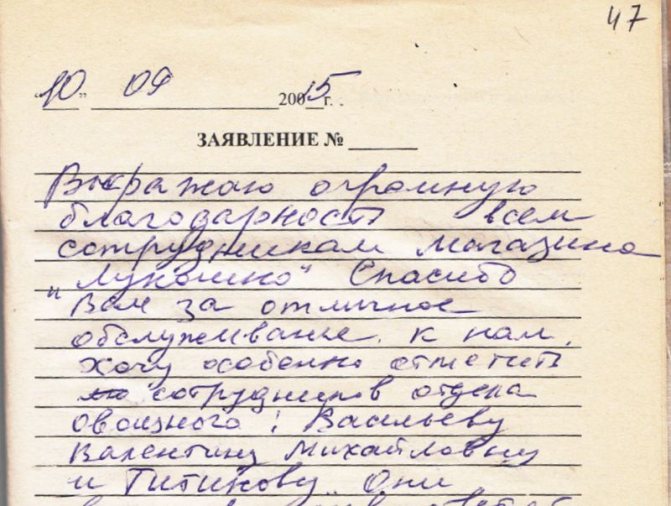
In cases where the complaint concerns directly the administration of the enterprise (gross violation of the rules of the service sector, inflated prices, negative reviews of work), the application must be transferred to senior management within a period of no more than five days for consideration and action.
The correctness of maintaining the complaint book in all structural divisions or departments of the enterprise must be checked by senior management at least once a quarter. Based on the results of the inspection, actions are taken to eliminate shortcomings in the work and the causes of consumer complaints. The results of checks and the actions taken must be recorded in the enterprise audit trail.
During inspections by regulatory authorities of the work of an institution related to the service sector, it is not allowed to remove the book of reviews and suggestions from the point of sale for any purposes (taking a copy, checking the correctness of filling, etc.).
Concept of delusion
Providing false information may not always be considered deception. Quite often, consumers can simply be misled. This concept is somewhat different from deception. Misrepresentation does not always pursue selfish goals. This often happens due to poor knowledge of the requirements of the current legislation by the implementer or performer. For example, a new seller, due to his short work experience, provided the buyer with incorrect information about the operating hours of the outlet or the prices of goods. In this case, personal gain was not the goal. However, this does not exempt you from responsibility. In such a situation, management may apply disciplinary measures to a specialist in such a situation.
Where is the inspection carried out?
Rospotrebnadzor checks goods presented in Russian retail outlets, public catering establishments or directly at enterprises.
The products themselves are analyzed in special laboratories created on the basis of Rospotrebnadzor. From the perspective of where the inspection will take place, inspectors will personally come to the enterprise or store (this is called an on-site inspection) or remotely request samples from them.
During the inspection, Rospotrebnadzor employees have the right to demand the necessary documents from the retail outlet, take samples from products, visit any premises, etc. Based on the results, a report is drawn up.
